The world needs bees. Unfortunately, man hasn’t been too kind to the world. So, the bees need us to undo some of the damage we’ve already done.
Had we been a little less reckless, they probably wouldn’t need us, but now, they do.
The plight of the honey bee has attracted not only recreational hobbyists but also those who are raising bees for profit.
Some beekeepers find a middle ground and aim to do both. These cases beg the question: is it really possible to make money from beekeeping?
The short answer is yes, and beekeeping for profit extends far beyond simply selling your own honey.
In fact, there are many ways to make money with beekeeping that most new and for-profit beekeepers aren’t aware of.
We often speak about what we can do for the bees. Now let’s see what they can do for us with our beekeeping business.
Five Beekeeping for Profit Strategies
Below are the top 5 ways that you can make money from beekeeping.
1. Earn Profit from Beekeeping by Selling Bee Products
The first way to make a little cash is by selling what bees make naturally.
Honey
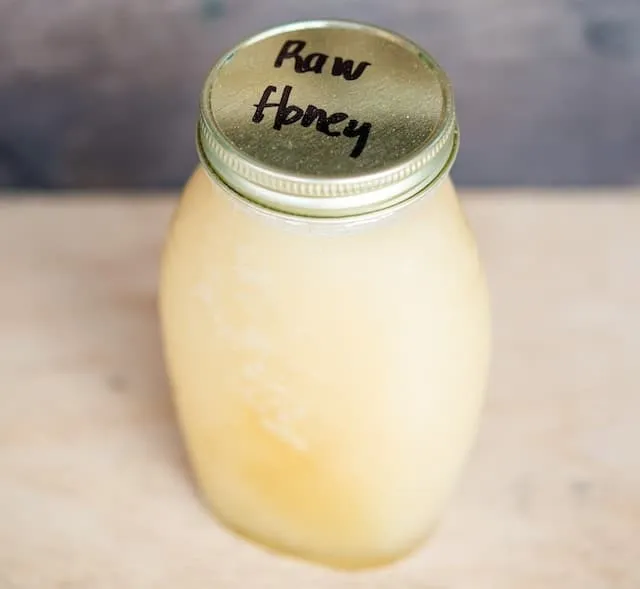
Honey is usually the first thing that pops into your mind when you hear beekeeping for the first time.
Production costs of local honey are very low, just enough to cover labor and packaging. Raw honey is particularly popular in this era of health consciousness. Without heat, honey is able to maintain the enzymes that provide you with added health benefits.
Commercial beekeepers have massive honey production and produce excess honey than they could immediately dispose of. To keep up, they allow their honey to undergo pasteurization, making it easier to pack, store, and sell honey.
Unfortunately, heating it above 104 degrees destroys the enzymes that give honey its unique nutritional value.
There are different types of honey, and honey flavor differs depending on the nectar source available. You can find yourself in possession of premium honey because blooms in your area are different from those found anywhere else.
If you have an orchard or specialize in berry production, such as strawberries, raspberries, and blueberries, your honey will have a completely different flavor than that of a keeper who relies on wildflowers. Since everyone’s taste preference is different, you are likely to capture the palate of someone who will be partial to the unique flavor of your honey.
Bees are designed to keep gathering nectar as long as the source is available. So don’t feel too bad about raiding their pantry. However, a responsible beekeeper knows when to harvest and how much to take so that he leaves the bees with enough inventory to keep them going.
One can harvest honey either by using an extractor or the crushing method, where you cut out the comb, crush it, sieve it, and enjoy the honey. If you have a flow hive, the process is further simplified because honey is on tap.
Once you’ve packed it, you’re ready to sell. The demand for honey is so high you are unlikely to have it in stock long.
Pollen
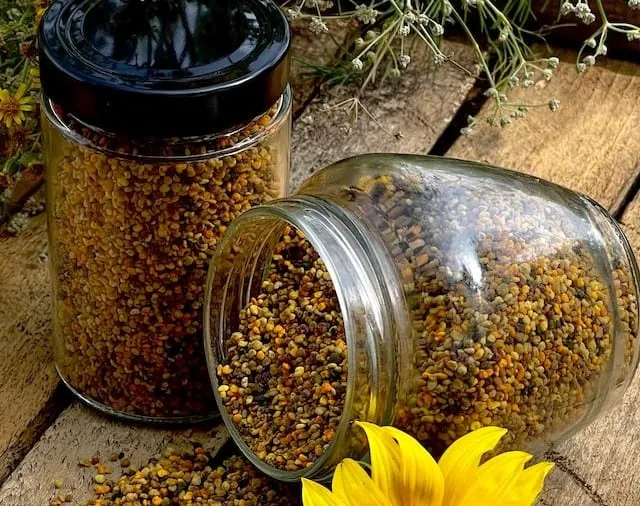
Pollen is the main source of protein for the bees and also acts as a dietary supplement for us.
It has a higher market value than honey because pollen duty isn’t designated to all foragers. Pollen is only available in small amounts.
Responsible collection of pollen demands that you only set up pollen traps for a couple of hours a day and do so for a few days a week, not throughout.
This is because the bees need pollen to raise brood, the babies of the family. If you take too much pollen, you are putting the health of the brood at risk.
Pollen is the one product that’s collected outside of the hive. All you need are these pollen traps . It’s a pretty simple process because the entrance to the hive is slightly obstructed, making it necessary for the bees to shed their pollen load before entering the hive.
The pollen collects in a small trough below the entrance. After a few hours, you remove the screen and allow them to continue storing their own supply of pollen.
Fresh pollen is quite perishable, so it is better preserved dry. Once you’ve collected it, you can either sell it fresh but packed well to lengthen its shelf life or dry it and package it for sale.
Propolis
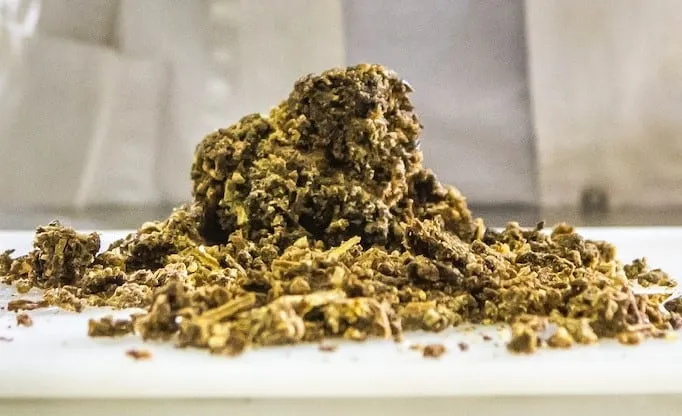
Bees really know how to clean houses, and their renovation skills are exceptional. They seal all the cracks and disinfect the hive with propolis.
Propolis is a sticky substance that bees carry from the secretions of various trees and plants.
Propolis like this one here , being the hive disinfectant, is ideal for medicinal use. All you need to get is a propolis trap. The amounts are small, but with a strong hive, you will have a good rate of production.
It is not as perishable as pollen, making it easier to deal with. As with most bee products, it has more demand than supply, making it even more valuable than pollen.
Wax
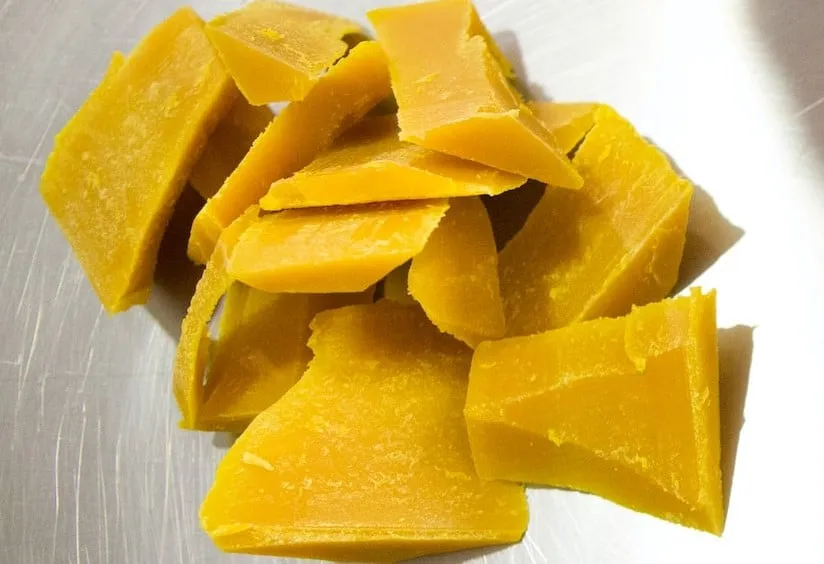
This one goes hand in hand with honey but only makes financial sense in bulk. If you use an extractor to harvest your honey, then the honeycomb gets recycled, and you wind up with very minute amounts of wax.
However, if you’re dealing with hundreds or thousands of hives, then you can harvest the honey and cut out the comb for rendering. Wax is quite light, so you’ll need big numbers to make this venture worthwhile.
You don’t have to sell beeswax in its simple form. The cosmetic industry has a great demand for beeswax products to make balms as well as hair products.
Let’s not forget about aromatherapy.
What would a bridal shower be without that spa pack with scented beeswax candles? With wax, there’s so much more you can do with the raw material that can increase the value of your final product.
Bee Venom
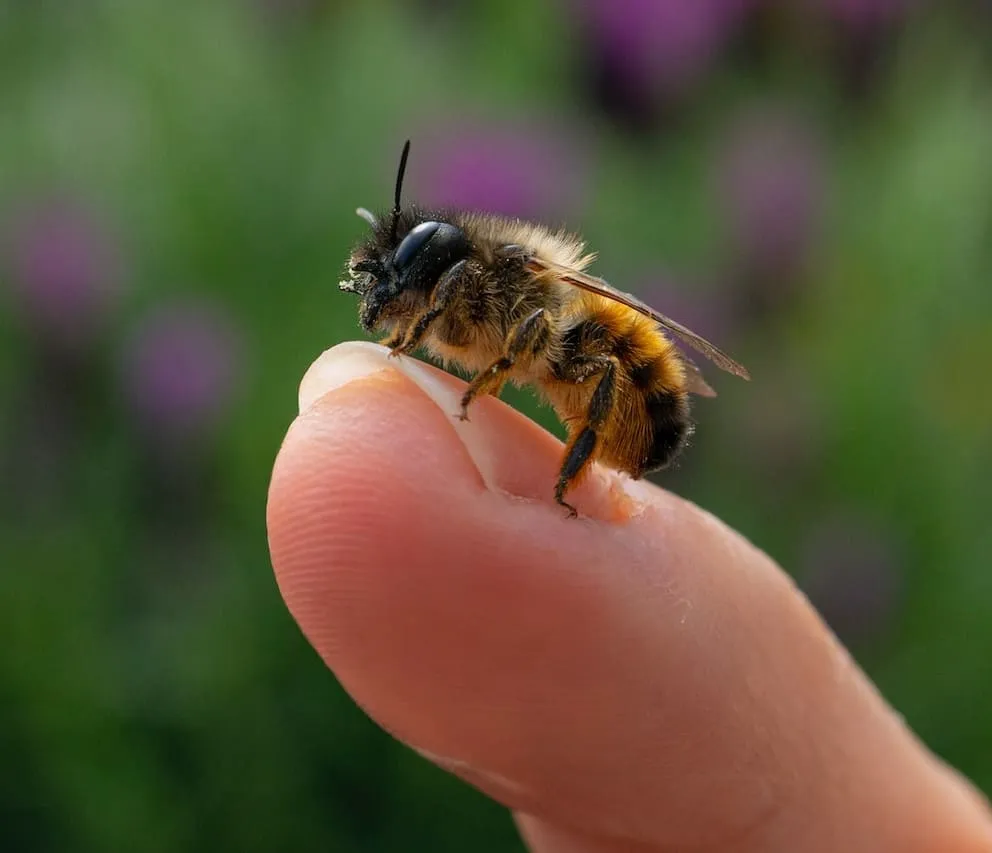
This is a relatively new medical treatment, which is a form of apitherapy. Bee venom is being studied for its potential to treat arthritis and other conditions, including phantom pains in amputees.
As science advances in this area, beekeepers will be able to provide a vital resource, so it’s definitely an area worth watching.
For now, the treatment is administered by having bees sting a specific area of the body. This process is what is commonly referred to as bee sting therapy.
Unfortunately, this means that the bee is like a capsule. Once it’s used, it dies. Even so, new harvesting techniques are being developed so today’s beekeepers can have pharmaceutical hives in the future.
2. Earn Profit from Beekeeping by Selling Pollinator Services
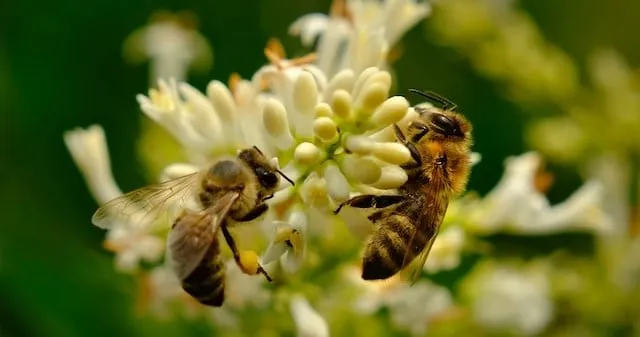
Think healthy eating, and terms like omega 3 start flying around. Once those omegas get going, they point in the direction of nuts. In the land of nuts, one of the richest inhabitants is the almond.
Apart from the nut itself, which is both delicious and nutritious, we have many other products, such as milk and oils. Even though nuts do grow on trees, it’s not as simple as it sounds. Almonds rely 100% on cross-pollination for production.
The flowers were not designed to self-pollinate, as with some vegetables. If the pollen of one flower doesn’t get to the pistil of the other, then there’ll be no almonds that year.
That’s why, every blooming season, the beautiful state of California imports thousands of bees from other states, such as North Carolina, and puts the ladies to work.
At the end of the season, it is time to bring the bees back to their homes. And, the beekeeper receives rewards --- a check and a uniquely flavored crop of honey.
With the declining population of bees, these kinds of services are becoming even more important for the supply of various horticultural products that depend on cross-pollination.
In the case of almonds, shipping is necessary because once the almond season is over, there’s nothing for the bees to feed on. It, therefore, makes it undesirable for almond producers to have their own hives because the bees could starve once the blooms die.
Other horticultural farms that could use these services may choose to outsource these pollinator services because they do not want to spend resources managing beehives. That’s where you come in.
They will be happy to provide a space for your hives, and then management is up to you, and as a beekeeper, that’s the joy of the job. The ladies do all the hard work, and you simply check in from time to time, ensuring that all is hunky-dory in the kingdom.
The added advantage of horticulture is that you don’t need to worry about nectar dearth because you will almost always have a food supply for your bees.
As a service to humanity, the presence and demand for your bees may keep pesticide use to a minimum and improve the quality of what we have going into our bodies.
3. Earn Profit from Beekeeping by Selling Bee Equipment
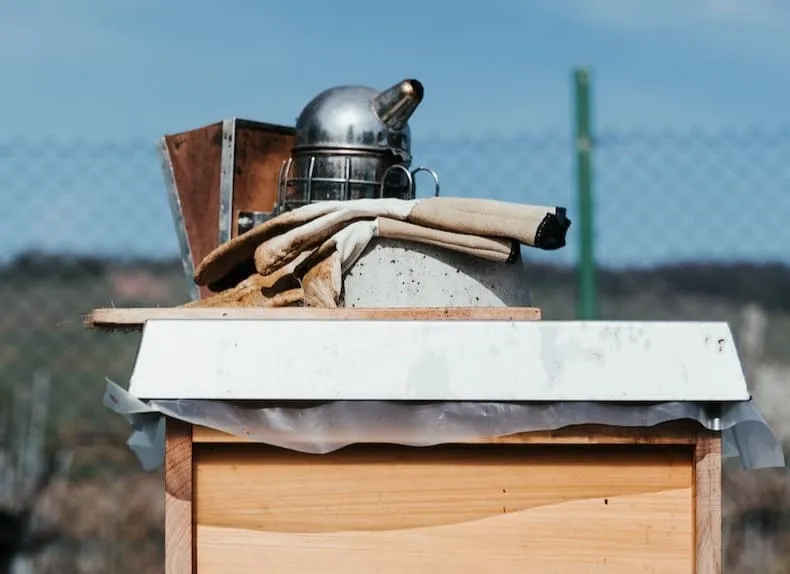
Beekeepers, or beeks as they are sometimes referred to, are nature types and don’t mind getting their hands dirty.
That doesn’t mean we are all handy with a saw and drill. Companies such as Dadant have been in existence for decades, mostly providing bee equipment.
Outside of the main hive components, there are other products you could offer.
Most DIY projects involve making extra features that don’t come with the original hive. That includes bee feeders like this one here , slatter racks, bee escapes, entrance reducers, robbing screens, and many more.
Once you create a brand of credibility and quality, you’ll be in the beekeeping business to earn more profit. Market research is easy to undertake.
You can start at the local beekeepers association or beekeeping community. They are usually the first stop for many beekeepers when they search for a supplier or service provider.
4. Earn Profit from Beekeeping by Selling Advisory Services
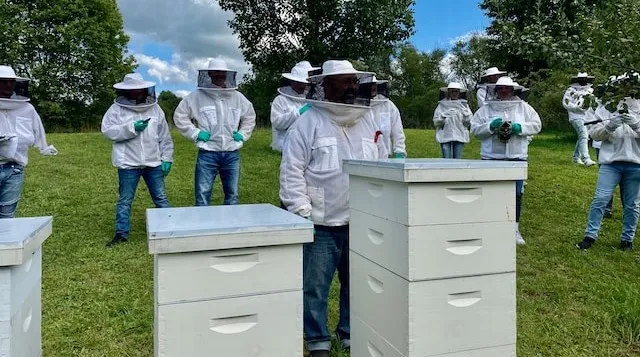
Beekeepers are born every day. Well, maybe they aren’t, but the plight of the bee has reached far and wide, and more people are responding to the call.
The major problem is that the first year of beekeeping is fraught with information overload or under-load, which usually leads to many mistakes.
As a seasoned beekeeper, you can provide advisory services to other beekeepers, especially newbies, to help them start and establish their hives when they begin.
I believe that one of the reasons there aren’t more of us is that few beekeepers make it past the first year. If the bees don’t survive the winter, many walk away from the project.
Sometimes, that guidance and encouragement from experienced beekeepers will give that nudge and light that spark to motivate a new beekeeper to give it just one more try.
This is possible to do even if you have a full-time job elsewhere. It doesn’t require more than a couple of hours with a client in a month or two.
You can give a lot of this advice remotely once you have done your initial visit, so it allows for a flexible schedule.
5. Earn Profit from Beekeeping by Becoming a Pollinator Seeds Supplier

Beekeepers aren’t the only people who love bees. Lots of people have pollinator gardens to provide nectar and pollen for honey bees and other bee species. And they don’t even have to own a hive.
To be honest, honey bees probably need more of these kinds of people than they do beekeepers.
Nectar and pollen from these plants and flowers increase their food source without increasing the population density of bees, which ultimately reduces competition for food, meaning safer food for the bees.
You could decide to specialize in selling pollinator seeds and seedlings for beekeepers and non-beekeepers alike.
This allows more people to participate in saving the bees without worrying about putting on the hazmat suit that beekeepers are known for.
Final Thoughts
When we first started using bees for our domestic needs, all we wanted to get at was honey. With time and science, we have found out that we can enjoy so much more from our six-legged comrades. We can earn more profit doing beekeeping.
Who knew that one day, the reason many shy away from bees, their infamous sting, would be just the breakthrough arthritic patients need to handle the inflammation that causes so much pain?
It would seem that scientists have just scratched the surface with their discoveries. And with these advancements come new products and opportunities.
Saving the bees isn’t only good for the environment or our health. You can turn it into a profitable business that would put a little cushion for your ever-increasing expenses. As far as motivators go, that last one usually gets us moving.

Thanks, a very informative article! Hope more people take on the bee keeper opportunity.
Dittos. Perfect article. Yesterday was World Bee Day May 20, 2021. Let there be gardens worldwide and honey harmony with God's great busy workers!
I would love to become a beekeeper. I’m at the proses of learning.
Good Article , I would mention once you have the experience and enough bees and equipment you could sell Nucs,Packages, and Eventually Queens, possibly new equipment even.
I would like someone to contact me on there knowledge on raising queens and raising more bees to sell packages of bees as i have hives now by in of summer hopefully to having 20 to 25 maybe I'd kept bees before back in erily 80,s but now I know so much more than I did before my goal is to this full-time as I one day would very much like to have on northern end 1000 hives or more
Hello here,
I needed a support, I am a female beekeeper in Africa , but I have had many women wanting to do beekeeping as I do but I can't support them as I can.
For this matter therefore do you support other bee keepers.
Thanks
Achan Vicky
This is a great article! Can someone talk with me about starting? I have 40 archers of land that I can put to great use for bees. The complication is that I live in Roseau MN. Which is 5 miles to Canada. Therefore the winters are BRUTAL. What does a person do with the bees during the winter months?
Hi, Mr. Kovernusz! Saludos desde Venezuela!
Use Carniolan Bees! They´re THE BEST for brutal winters!
During winter, get them ready with their foods and protectors. Read the Michael Bush´page about winterising beehives.
And You, go to the beaches in California or Florida! Jajajaja
The most important thing for Northern bee keepers as I have found living in Wisconsin is to create wind breaks if possible on the north and west side of your hives. Otherwise trees and other natural wind breaks work well. Shelter the hives using your surroundings if you can. Wrap your hives with insulation once the temps begon to stay below freezing. Provide your bees with extra food during the winter in the form of insulated candy boards. Insulated candy boards provide 3 benefits. Helping to keep the hive warm. Feeding nutritious food they will need once their stores are used up abd the candy will also absorb moisture in the hive which will kill the bees fast if it becomes a problem. Keep the bottom entrance free of snow after each snowfall.
Checkout Canadian Beekeeper’s Blog on YouTube. Ian Steppler is his name. He lives in Miami, Manitoba.
This is amazing information, and novel as well! (At least to me!) Thank you.
Yes, Thank you all the feedback I been reading has been very helpful to me I'm 55 now as a young child brought up in the mountains of the deleware river I watch my elders do there thing with the honey and the bees buts it's been very helpful for me to no that the ritual still goes on and I am interested dearly to start "BIG Bee HONEY BARN" Im holding on to a prayer to open a location to distribute but everyone words been so helpful.
Lord please bless Sherry and hear her prayer in the name of Jesus. Amen!
Bees needed worldwide Lord bless all farmers please.
How much land do you need to start?
A hive is only about 2 square feet. If you have a flat roof, you can even put them on the roof. They need tens of thousands of flowers blooming at different times to create a steady source. Not all flowers provide nectar or pollen. Some do one, some both, and done neither. Fortunately, they can fly up to a few miles looking for it. Thus the question is not how much land you need, but what blooms are there, how many, and when do they bloom in your area. Basically, is there enough feed in your area? I live in the country, but every year I have to supplement my bees most of the summer. It's pasture and farm land all around me, but many of the crops are not helpful to the bees.
Last year, for the first time ever I started raising bees... bees are wonderful creatures, I just hate to see their numbers dwindling in so many places. So, I have made a commitment to do my part...I love your articles! I don't know if I'll ever make it that big but I sure enjoy interacting with those little fellas!
Good job Owen.
Someone told me that an empty Bee Hive is worth a lot of money. How true is this and, why would ppl pay money for an empty bee hive.
Hi all.
Been looking at beekeeping for a while now. Have just found a place nearby that offers rescue bees to the right place.
What’s a rescue bee ?
I’m in Spain so there’s a language breakdown for sure on my behalf lol
What is the best amount of bees to start a bee business and what is the cost???
My friend in Switzerlad also makes soaps and candles out of the beewax extracted from his hives.
I've got roughly half of a million bees. I'm trying to sell the hives and Bees to someone who will take proper care of them.
Does anyone know where I should be looking to find such a person?
Thank you for a detailed information about beeping and products. I am working a sustainable development program for West Africa and this information will help my farming project. I hope to keep up with your newsletters.
My question to you is, can sugarcane benefit from bees or can bees benefit from sugarcane?
I am also told that wasps and pine martens can cause a lot of damage to bees!